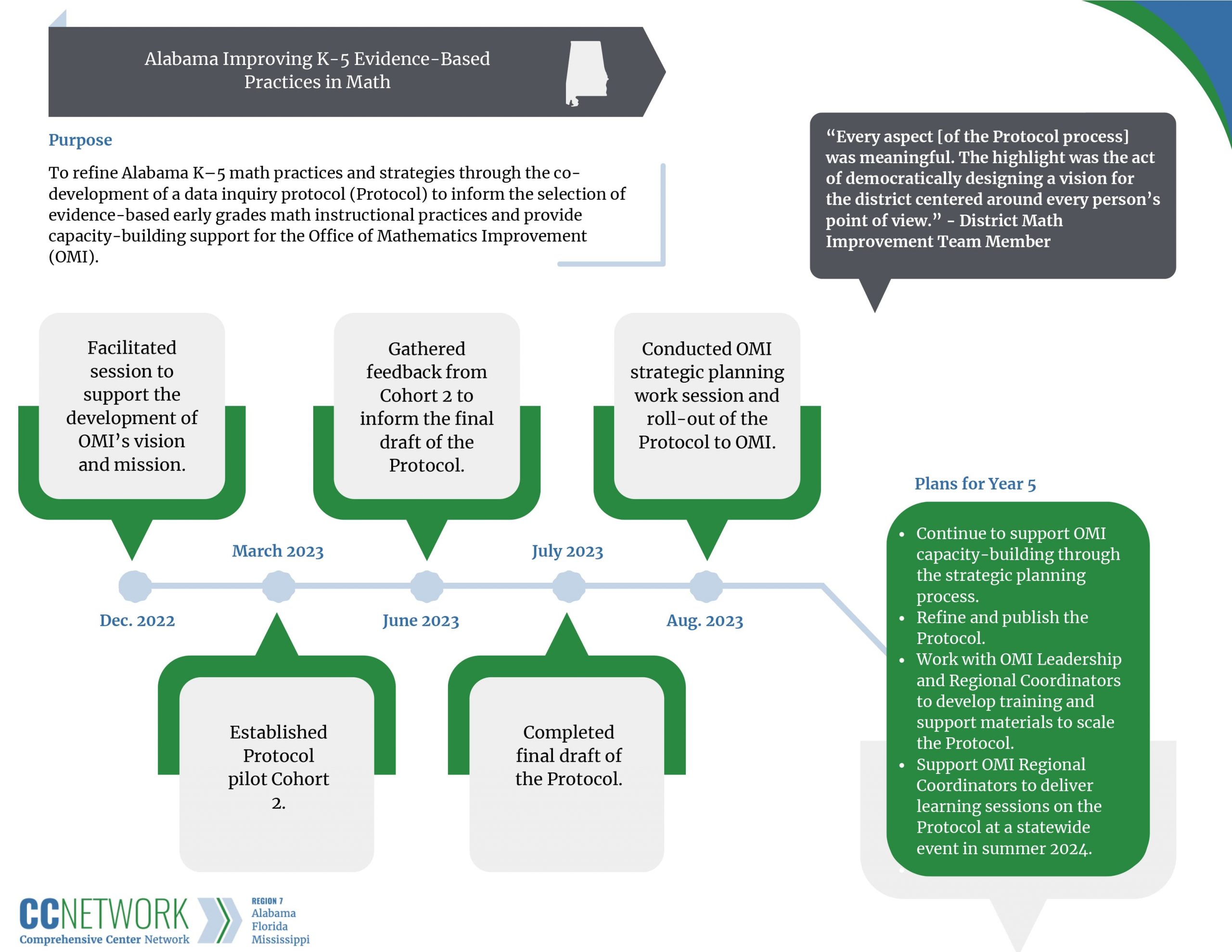Content Start
Why?
Alabama has experienced chronically low student proficiency in K–5 numeracy as measured by the National Assessment of Educational Progress. The passage of the Alabama Numeracy Act (ANA) prompted a need for organizational capacity-building using evidence-based practices to support mathematics instruction by promoting best practices, resources, professional learning, and coaching.
What?
Over the past three years, the Region 7 Comprehensive Center (R7CC) has supported the Alabama State Department of Education (ALSDE) in developing and implementing processes and systems to build and support effective mathematics instruction by:
- Gathering resources and best practices on existing frameworks that use data to inform the selection of evidence-based instructional strategies.
- Collaborating to identify and design a Data Inquiry Protocol (Protocol) to inform instructional decision-making and facilitating work sessions to engage feedback loops on the use of the Protocol.
- Guiding the development of a professional learning plan to support the use of the Protocol.
- Identifying evidence-based instructional practices geared towards mathematics instruction.
- Supporting the establishment of the Office of Mathematics Improvement (OMI) through the development of OMI’s vision and mission and strategic planning process.
R7CC currently supports ALSDE in developing processes to implement OMI’s strategic plan and support the implementation of the Protocol professional learning plan.
Impact?
The collaboration between ALSDE and R7CC will result in sustainable change, including:
- A process to develop a vision, mission, and strategic plan to guide the work of OMI and implement the ANA.
- A Data Inquiry Protocol that provides a systematic process for identifying, acting on, and evaluating data-informed actions.




 This material is in the public domain. While permission to reprint is not necessary, publication should be cited. This website was funded through the Office of Elementary and Secondary Education (OESE) and developed by the Region 7 Comprehensive Center at RMC Research Corporation. (Award # S283B190023). This website contains resources that are provided for the reader's convenience. These materials may contain the views and recommendations of various subject matter experts as well as hypertext links, contact addresses, and websites to information created and maintained by other public and private organizations. The U.S. Department of Education does not control or guarantee the accuracy, relevance, timeliness, or completeness of any outside information included in these materials. The views expressed herein do not necessarily represent the positions or policies of the U.S. Department of Education. No official endorsement by the U.S. Department of Education of any product, commodity, service, enterprise, curriculum, or program of instruction mentioned in this document is intended or should be inferred.
This material is in the public domain. While permission to reprint is not necessary, publication should be cited. This website was funded through the Office of Elementary and Secondary Education (OESE) and developed by the Region 7 Comprehensive Center at RMC Research Corporation. (Award # S283B190023). This website contains resources that are provided for the reader's convenience. These materials may contain the views and recommendations of various subject matter experts as well as hypertext links, contact addresses, and websites to information created and maintained by other public and private organizations. The U.S. Department of Education does not control or guarantee the accuracy, relevance, timeliness, or completeness of any outside information included in these materials. The views expressed herein do not necessarily represent the positions or policies of the U.S. Department of Education. No official endorsement by the U.S. Department of Education of any product, commodity, service, enterprise, curriculum, or program of instruction mentioned in this document is intended or should be inferred.